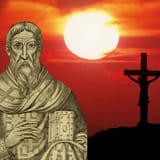Search Results
7/3/2025, 6:10:13 PM
>>17811657
>He was a pagan. The fuck are you on about? Suddenly Neo-Platonists aren't pagans because they have all the things you ascribe pagans as not having?
Plotinus was a pagan in the loose sense, sure, but his Neoplatonism isn’t the same as the folk paganism of temple sacrifices and polytheistic rituals. His “One” is a philosophical abstraction, not a deity you’d see in a Greek temple. Paganism as a system lacks the cohesion his ideas tried to impose. Most pagans weren’t reading Plotinus, they were burning goats to Apollo.
>Neo-Platonism takes the idea of divinity from Platonism. Your equating to Christian theology should be the other way around as Platonism is an older tradition.
Platonism’s older, no shit, but Christianity synthesized it better. Augustine and the Church Fathers took Plato’s forms and Plotinus’ One and grounded them in a personal God with a moral will. Pagan Platonism stays abstract, detached from the lived religion of the masses. Christianity made it accessible and universal.
>Many philosophers were religious figures and many of them were priests.
Some were, sure, but Plotinus wasn’t running a cult or leading rituals. He was a thinker, not a shaman. Pagan priests weren’t out there debating metaphysics, they were cutting open animals for omens.
>Neither did the Nicene Creed, or the arguments around the mode of energy of Christ. There was never a unified Christian worship either.
The Nicene Creed standardized core doctrine (Trinity, Christ’s divinity, one Church, etc.). Yeah, there were schisms and debates, but compare that to paganism’s total lack of a central authority or agreed-upon canon. Christianity’s got ecumenical councils; paganism’s got a hundred local gods with zero consensus. You’re dodging the point: Catholicism’s framework is light-years more coherent than paganism’s patchwork.
>He was a pagan. The fuck are you on about? Suddenly Neo-Platonists aren't pagans because they have all the things you ascribe pagans as not having?
Plotinus was a pagan in the loose sense, sure, but his Neoplatonism isn’t the same as the folk paganism of temple sacrifices and polytheistic rituals. His “One” is a philosophical abstraction, not a deity you’d see in a Greek temple. Paganism as a system lacks the cohesion his ideas tried to impose. Most pagans weren’t reading Plotinus, they were burning goats to Apollo.
>Neo-Platonism takes the idea of divinity from Platonism. Your equating to Christian theology should be the other way around as Platonism is an older tradition.
Platonism’s older, no shit, but Christianity synthesized it better. Augustine and the Church Fathers took Plato’s forms and Plotinus’ One and grounded them in a personal God with a moral will. Pagan Platonism stays abstract, detached from the lived religion of the masses. Christianity made it accessible and universal.
>Many philosophers were religious figures and many of them were priests.
Some were, sure, but Plotinus wasn’t running a cult or leading rituals. He was a thinker, not a shaman. Pagan priests weren’t out there debating metaphysics, they were cutting open animals for omens.
>Neither did the Nicene Creed, or the arguments around the mode of energy of Christ. There was never a unified Christian worship either.
The Nicene Creed standardized core doctrine (Trinity, Christ’s divinity, one Church, etc.). Yeah, there were schisms and debates, but compare that to paganism’s total lack of a central authority or agreed-upon canon. Christianity’s got ecumenical councils; paganism’s got a hundred local gods with zero consensus. You’re dodging the point: Catholicism’s framework is light-years more coherent than paganism’s patchwork.
Page 1
